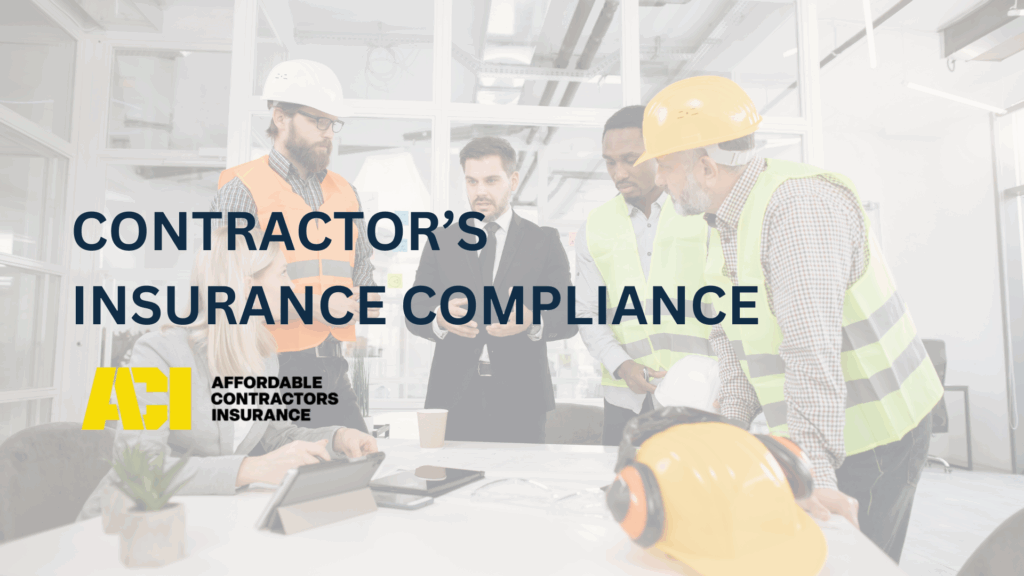
Construction and remodeling jobs can get very expensive, but while it’s true that staying within budget should be one of your biggest priorities, it’s equally important to ensure that the contractor you hire has all the necessary contractor’s insurance in place.
Hiring the right pro starts with one essential step: verifying that your contractor is licensed and insured. Skipping this check can expose you to fines, liens, injury claims, and costly do-overs. In this guide, we’ll show you exactly how to check if a contractor is licensed and insured—from looking up their license with your state board to confirming general liability and workers’ compensation coverage, reviewing a certificate of insurance (COI) for active dates and limits, and validating endorsements (like additional insured) and bonds where required.
Whether you’re a homeowner, property manager, or GC, knowing how to verify a contractor’s license and insurance protects your budget, timeline, and peace of mind—and it’s simpler than you think.
Need proof of coverage or a fresh COI for your next bid?
Affordable Contractors Insurance (ACI) helps contractors secure the right policy and deliver fast, reliable certificates so clients can verify coverage with confidence.
Never Hire an Uninsured Contractor (Here’s Why)
Hiring a contractor without insurance might look cheaper up front, but it can become the most expensive decision on your project. If a worker is injured, a tool sparks a fire, or a plumbing line bursts, you could be on the hook for medical bills, third-party property damage, legal fees, and lost-use costs. Home policies often exclude contractor-caused losses, leaving you exposed.
By contrast, fully insured contractors carry general liability (for property damage and bodily injury) and workers’ compensation (for employee injuries). When something goes wrong, their policies—not your wallet—cover the claim. That protection extends to incidents involving subcontractors when coverage is set up correctly and endorsements (like additional insured and waiver of subrogation) are in place.
Quick checklist before you sign:
- Ask for a Certificate of Insurance (COI) issued by the agent—verify legal business name, policy numbers, limits, and effective/expiration dates.
- Confirm workers’ comp if they have employees or use subs.
- Require additional insured and primary & noncontributory language if your contract calls for it.
- Match the license classification to the scope of work.
Bottom line: Hiring an uninsured contractor transfers risk to you. Hiring an insured contractor transfers risk to their carrier—where it belongs.
Types of Contractor Insurance You Should Require (and Why)
Before you sign a contract, verify your contractor’s insurance with a Certificate of Insurance (COI) issued by their agent. Requirements vary by state and project; if you’re unsure what’s required, ask Affordable Contractors Insurance (ACI) to review your bid or contract language and recommend compliant limits.
Commercial General Liability (CGL)
Protects against third-party bodily injury, property damage, and completed operations claims tied to the work. Confirm per-occurrence and aggregate limits that meet your project requirements, plus endorsements like Additional Insured, Primary & Noncontributory, and Waiver of Subrogation when specified.
Not sure which endorsements or limits you need?
Workers’ Compensation (Statutory) + Employers’ Liability
Covers employee injuries on the job and shields you from injury-related liability. Verify active coverage for the contractor and any subcontractors.
Commercial Auto (Owned, Hired & Non-Owned)
Required when vehicles are used to transport crews, tools, or materials. Confirm auto liability and that hired and non-owned autos are included when applicable.
Need help matching auto coverage to your scope?
Umbrella/Excess Liability
Adds an extra layer of protection above GL, Auto, and Employers’ Liability for larger or higher-risk projects.
Don’t know how much excess coverage to require?
Role-specific coverages (as applicable):
- Professional Liability (E&O) for design-build, engineering, or advisory work.
- Contractors Pollution Liability for environmental exposures (e.g., roofing, HVAC, remediation).
- Builder’s Risk for materials and the project during construction (sometimes carried by the owner).
- Cyber Liability if the contractor handles client data or remote access.
Verification tips (fast checklist):
- Match the legal business name on the COI to the contract and license.
- Confirm policy numbers, effective/expiration dates, and required limits/endorsements.
- Require the COI to be issued directly by the agent, not the contractor.
- Verify coverage for subcontractors and keep updated COIs on file throughout the project.
If anything looks off, forward the COI to ACI—We will validate it for you.
Need compliant coverage and fast COIs?
Affordable Contractors Insurance helps contractors meet state and contract insurance requirements and delivers quick, reliable certificates clients can verify with confidence.
How to Verify a Contractor’s Insurance
Contractors can prove that they have the necessary insurance coverage by presenting a Certificate of Liability Insurance. Be forewarned, though, that a certificate is not enough to establish coverage. You need to verify the details with the agent listed in the certificate and request for a certificate of insurance from the contractor’s insurance company to guarantee that the contractor is indeed fully insured.
You may ask the insurer to designate you as an additional insured on your contractor’s general liability insurance as added protection in the event of damages and claims arising from the contractor’s work.
Most importantly, never assume that the contractor you’re dealing with has insurance, regardless of how recommended their services are. Always inquire about your prospects’ coverages and check with the insurer yourself. An expired insurance policy is tantamount to no coverage at all.